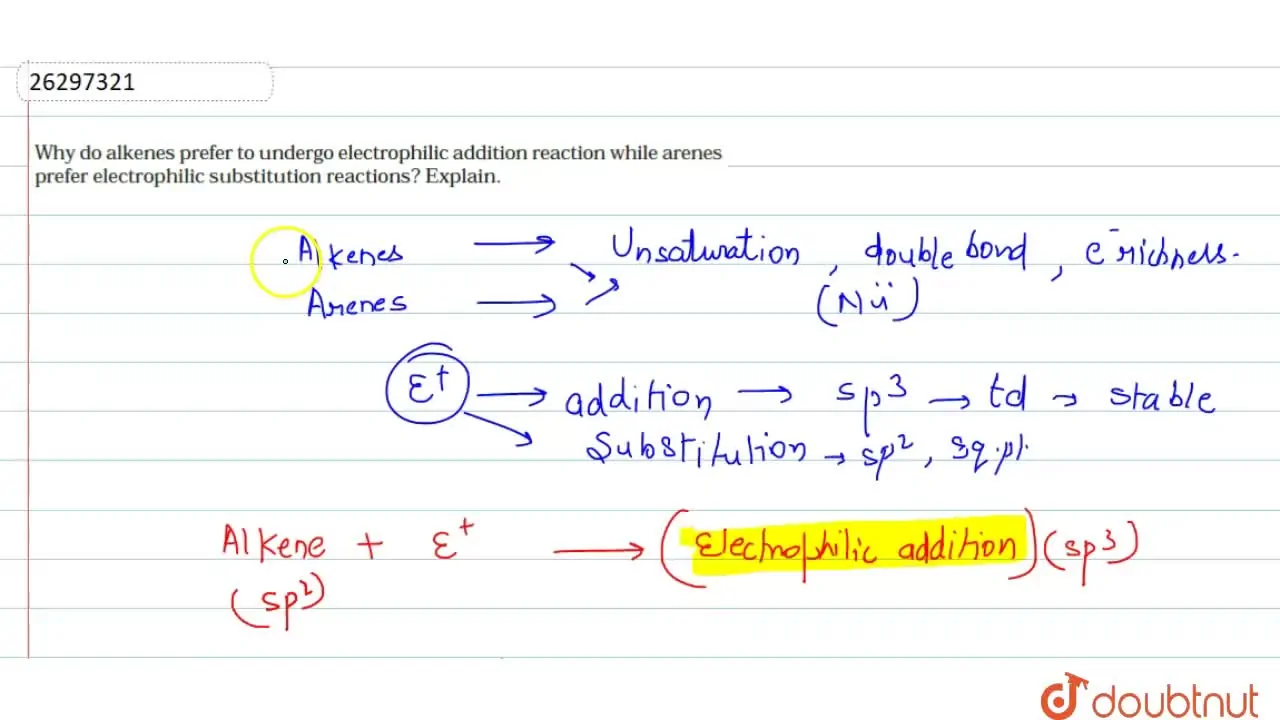Why do alkenes prefer to undergo electrophilec addition reaction while arenes prefer electrophilic substitution reactions ? Explain.
Video Solution
Text Solution
Due to the presence of π-electron cloud above and below the plane of alkenes and arenes, these are electron rich molecules and therefore, provide sites for the attack of electrophiles. Hence, they undergo electrophilic reactions, The alkenes undergo electrophilic addition reactions because alkenes are unsaturated molecules. For example,

Arenes, on the other hand, cannot undergo electrophilic addition reactions. This is because benzene has a large resonance energy of 150.4kJmol−1. During electrophilic addition reaction, two new σ-bonds are formed but the aromatic character of benzene gets destroyed and therefore, resonance energy of benzene ring is lost. Hence, electrophilic addition reactions of arenes are not energetically favourable, Arenes, in contrast undergo electrophilic H substitution reactions in which σ C-H bond is broken and new σ C-X bond is formed. The aromatic character of benzene ring is not destroyed and benzene retains its resonance energy. Hence, arenes undergo electrophilic substitution reactions,
|
Updated on:21/07/2023
Related Playlists
- BOOK - MODERN PUBLICATIONCHAPTER - HYDROCARBONSEXERCISE - NCERT FILE (NCERT EXEMPLAR PROBLEMS) (MATCH TYPE QUESTIONS)4videos
HYDROCARBONS
- BOOK - MODERN PUBLICATIONCHAPTER - HYDROCARBONSEXERCISE - NCERT FILE (NCERT EXEMPLAR PROBLEMS) (Assertion and Reason Type Questions)3videos
HYDROCARBONS
- BOOK - MODERN PUBLICATIONCHAPTER - HYDROCARBONSEXERCISE - NCERT FILE (NCERT EXEMPLAR PROBLEMS) (Multiple Choice Questions (Type-II))9videos
HYDROCARBONS
- BOOK - MODERN PUBLICATIONCHAPTER - HALOALKANES AND HALOARENESEXERCISE - UNIT PRACTICE TEST12videos
HALOALKANES AND HALOARENES
- BOOK - MODERN PUBLICATIONCHAPTER - HYDROGENEXERCISE - UNIT PRACTICE TEST (for Board Examination)9videos
HYDROGEN
Similar Questions
Why do alkenes prefer to undergo electrophilec addition reaction while arenes prefer electrophilic substitution reactions ? Explain.
View SolutionElectrophilic Addition Reaction
View SolutionElectrophilic Addition Reaction
View SolutionWhy do alkenes undergo electrophilic addition reactions ?
View SolutionWhy do alkenes undergo electrophilic addition reactions ?
View SolutionElectrophilic substitution reaction in Haloarenes
View SolutionHaloalkanes undergo nucleophilic substitution reactions while haloarenes undergo electrophilic substitution reactions. Explain.
View SolutionThe example of an electrophilic substitution reaction is
View SolutionFor an electrophilic aromatic substitution reaction
View SolutionElectrophilic Addition Reaction |Summary
View Solution


